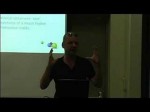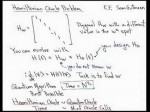September 16, 2012

Google Tech Talks December, 6 2007 ABSTRACT This tech talk series explores the enormous opportunities afforded by the emerging field of quantum computing. The exploitation of quantum phenomena not only offers tremendous speed-ups for important algorithms but may also prove key to achieving genuine synthetic intelligence. We argue that understanding higher brain function requires references to quantum mechanics as well. These talks look at the topic of quantum computing from mathematical, engineering and neurobiological perspectives, and we attempt to present the material so that the base concepts can be understood by listeners with no background in quantum physics. This first talk of the series introduces the basic concepts of quantum computing. We start by looking at the difference in describing a classical and a quantum mechanical system. The talk discusses the Turing machine in quantum mechanical terms and introduces the notion of a qubit. We study the gate model of quantum computing and look at the famous quantum algorithms of Deutsch, Grover and Shor. Finally we talk about decoherence and how it destroys superposition states which is the main obstacle to building large scale quantum computers. We clarify widely held misconceptions about decoherence and explain that environmental interaction tends to choose a basis in state space in which the system decoheres while leaving coherences in other coordinate systems intact. Speaker: Hartmut Neven
Tags: education, emerging, engedu, fix it, googletechtalks, series-explores, talk, talks, tech, techtalks
Posted in Slow Working Computer | No Comments »
January 14, 2012

Google Tech Talks April, 2 2008 ABSTRACT Imagine a game where two players go back and forth making moves and at the end of a fixed number of moves the position is either a win or a loss for the first player. In this case, if both players play best possible, it is determined at the first move who wins or loses. To figure out who will be the winner you need not look at all of the N final positions but only at N^0.753. I will show that with a quantum computer the exponent can be reduced to 0.5. The technique involves quantum scattering theory and illustrates how ideas from physics can be used to design quantum algorithms that outperform even best possible classical algorithms. Speaker: Edward Farhi Professor of Physics; Director, Center for Theoretical Physics Massachusetts Institute of Technology Research Interests: Edward Farhi was trained as a theoretical particle physicist but has also worked on astrophysics, general relativity, and the foundations of quantum mechanics. His present interest is the theory of quantum computation. As a graduate student, Farhi invented the jet variable “Thrust,” which is used to describe how particles in high energy accelerator collisions come out in collimated streams. He then worked with Leonard Susskind on grand unified theories with electro-weak dynamical symmetry breaking. He and Larry Abbott proposed an (almost viable) model in which quarks, leptons, and massive gauge bosons are composite. With Robert Jaffe, he worked out many of the …
Tags: diy, education, edward-farhi, google-tech, massachusetts, outperform-even, physics, talks, tech, technology, techtalk, theory
Posted in Slow Working Computer | No Comments »




